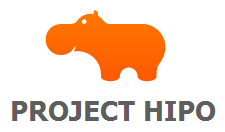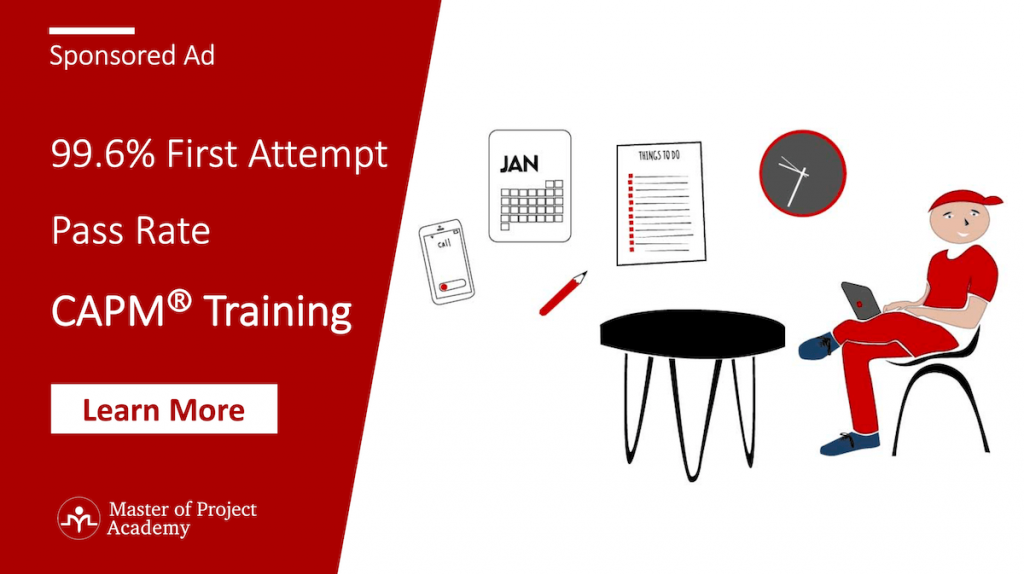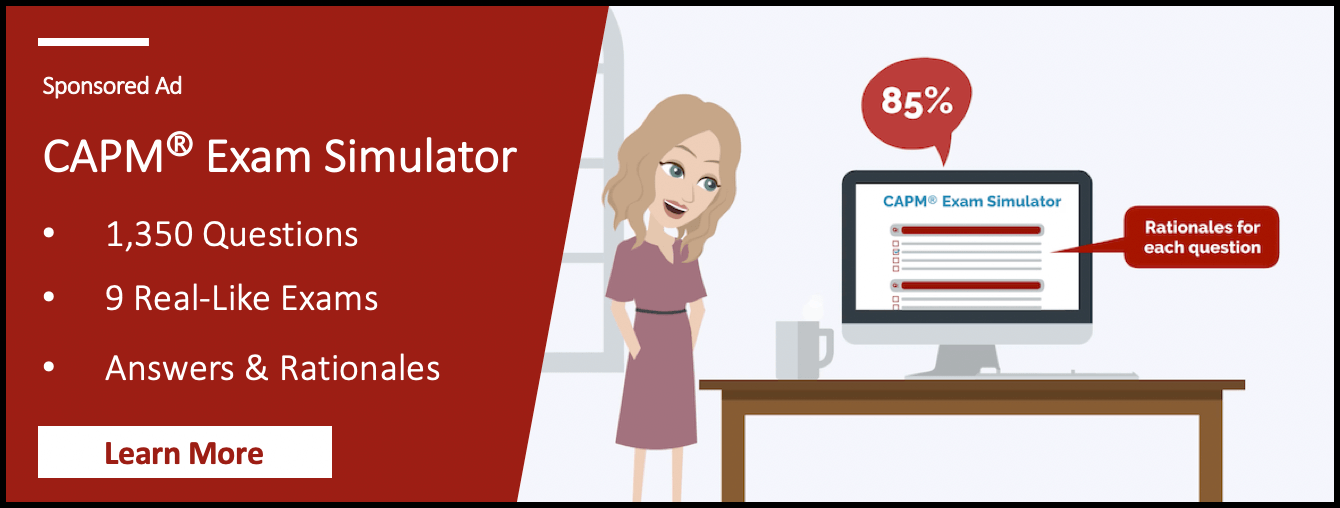Are you a quality professional who wishes to diversify her skills or is looking to advance her career to the next level? Are you a college student who wants to start his career in Project Management? If any of answer is yes then CAPM certification is the right choice for you. CAPM Certification will give you an edge over the others. Also, it is a highly valuable certification for people working in the project management field. Furthermore, it will help you to stand out among your fellow team members.
Hence, in this article, I will provide you all details related to CAPM certification like the requirements, benefits, cost, exam structure, books to study, how to apply, exam details, contents, etc. Thu, you will find a compiled list of all the must to know things about CAPM certification. So, hopefully, this article will help you to determine whether CAPM certification is right for you or not.
Content outline of this post:
What is the CAPM Certification?
What are the CAPM Certification Requirements?
How can I apply for the CAPM Certification Exam?
What is the CAPM Certification Cost?
Define what is the CAPM Certification Exam Structure?
What Are the CAPM Certification Knowledge Areas?
What Are the CAPM Certification Exam Formulas?
How Should I Study for the CAPM Exam?
How Can I Earn CAPM PDUs?
When is the Next CAPM Certification Exam Date?
What is the CAPM Certification Exam Passing Score?
What Are the Benefits of CAPM Certification?
How can I Renew CAPM Certification?
What Changes in the CAPM Certification Exam and When?
Conclusion
What is the CAPM Certification?
CAPM certification stands for Certified Associate in Project Management. It is an entry-level globally recognized certification or introductory level certification. Besides, this certification is specially designed for those professionals with little or no project experience. Furthermore, it demonstrates your understanding of the fundamental knowledge, terminology, and processes of effective project management as defined in the PMBOK Guide.
This is offered by the Project Management Institute (PMI). Moreover, CAPM certification is a credential that recognizes professionals who are new to project management. CAPM certification is useful for less experienced project practitioner who is looking to demonstrate his commitment to project management. Additionally, it is ideal for those who want to improve their ability to manage larger projects, earn additional responsibility and stand out to potential employers. Besides, this is the first building block for your project management career. Moreover, the best aspect of CAPM certification is that it is recognized globally and valid across the globe. CAPM certification is independent of any industry, domain or geographical location.

History of CAPM Certification
CAPM certification is an entry-level credential from PMI. Likewise PMP, CAPM is based on ‘PMBOK Guide’. They teach the same principles but CAPM certification is for those with less experience.
PMI introduced CAPM certification in 2003 i.e. 16 years ago. Further, CAPM certification teaches the principles and terminology of the PMBOK Guide. Hence, for those aspiring to a career in project management, successful attainment of certification will show that you can:
- Work as an informed member of a project team, handling a variety of project management responsibilities
- Examine and analyze the inputs, tools, and techniques of the processes and knowledge areas of PMBOK Guide
- Describe each process group and knowledge area of the PMBOK Guide.
Evolution of CAPM Certification
CAPM Certification was evolved in 2003 i.e. 19 years after PMP certification was introduced. PMI designed CAPM certification for:
- Those entering into project management
- Project team members who want more project management experience
- Existing project managers who don’t meet PMP prerequisites
- Those aspiring for PMP qualification down the line
What are the CAPM Certification Requirements?
In order to be eligible for CAPM certification, you must meet certain education requirements.
CAPM Certification Attained Education Requirement
At a minimum, you need to have a high school diploma or global alternative
CAPM Certification PM Education Requirement
In CAPM Certification, you do not need any prior experience in project management. Therefore, it is not necessary to work as lead profile in managing projects. In other words, one needs to have at least a high school diploma or global equivalent and must have attended 23 contact hours of project management education. Once you have satisfied these two requirements, you can apply for CAPM certification.
23 Hours of Project Management Education
You can attend in a 23 hours instructional project management education to satisfy CAPM education requirements. You can consider attending in Master of Project Academy’s CAPM Training (Sponsored).
How can I apply for the CAPM Certification Exam?
PMI has introduced an online certification system to apply for all certifications like CAPM, PMP, PMI-RMP, PMI-ACP, etc.
The first and foremost step is to make sure that you meet the eligibility criteria mentioned in the above section.
There are 2 modes of filling the application: Online mode or Printable version of the CAPM certification exam application.
CAPM Certification Online Application
First, gather all data related to the application and then start filling the application. Once you start an online application, you cannot cancel it. But, it is not mandatory to complete the application in one go. Hence, you can save it anytime and come back to it later. Further, you can edit any information you have already entered.
The application will remain open for 90 days. So during these 90 days, PMI will send an email reminder to complete the application. After, you have to schedule and sit for examination within 1 year eligibility period.
Steps to fill the online application
In the first steps of your application, you record your education background and attended project management education.
Step 1: Attained Education Level
- You must have at least secondary education level to apply for CAPM certification.
- This is equivalent to high-school degree
Step 2: Project Management Education
- If you choose to record 23 contact hours then you must record all education hours. It is regardless of when they were accrued. Here, one hour of classroom instruction equals one contact hour.
- You can attend a course, workshop and training sessions offered by one of the following types of education providers:
- PMI Registered Education Providers (REP)
- PMI Chapters
- Employer or company-sponsored programs
- Training companies or consultants
- Distance learning companies which include an end of course assessment
- University/college academic and continuing education programs
- You cannot earn contact hours by attending PMI chapter meetings or self-directed learning (e.g. reading books, watching instructional videos or sessions with mentors)
CAPM Certification Paper Application
Another way to fill the application form of CAPM Certification is paper application. Here, a printable version of the application is available on a case to case basis. You need to contact customer care to submit a request. Hence this is an offline mode here; you have to send your application through courier. The CAPM certification exam application form is similar to the one discussed above. Besides, applications, when submitted online using the certification system, will be processed in 24 hours or less. But if you have submitted a paper application, it will take longer based on the speed of delivery and processing workload.
Hence the most suitable way to fill the application form for CAPM application is online mode. The reason is that it is easier and more convenient.

CAPM Certification Application Review Process
- First PMI receives your application. After they confirm that you meet the eligibility criteria, also check if your attained education level and project management training is valid and consistent with the guidelines stated in certification handbook
- Typically, the application review period will take 5-10 days.
- Still, a number of applications are randomly chosen for audit. That’s because PMI conducts application audits to confirm the CAPM certification requirements documented on certification applications.
CAPM Certification Audit process
- Let’s say that your application is selected for an audit. First, you will be notified by email and this mail will provide detailed information on how to comply with the terms of the audit.
- During an audit, you will be asked to submit supporting documentation such as:
- Copies of your diploma or global equivalent
- Signature from your supervisor or manager from the project mentioned on the application
- Copies of certificates from the training institute for each course recorded on the application to meet the required contact hours of training in project management practices.
- Then, PMI provides you 90 days to submit the requested documentation. Once documentation is submitted, the audit should take about 5 to 7 business days to complete.
- Further, you can send audit forms by postal mail or courier service in one envelope.
- Hence, once you successfully complete the audit, your one-year examination eligibility period starts.
- If submissions are incomplete, then it will result in failure of the audit. Then, there is a one year suspension period before applying for certification again.
CAPM Certification Payment
- Once PMI notifies that the CAPM certification exam application is approved now it is time to make payment via an online system.
- You need to go back to the online certification system to complete the steps like:
- Select your examination delivery method
- Request a language aid for your exam at no extra cost
- Request test accommodations for your examinations at no extra cost
- Submit payment via credit card, cheque, money order or wire transfer
- After PMI receives the payment, they email you the eligibility number that you can use to schedule your test appointment. This is valid for one year and you may take the exam up to 3 times during the year.
CAPM Certification Refund Policy
Suppose you have not appeared or planned to appear for the CAPM certification exam before the expiry date, then you must make a request at least 30 days before the exam eligibility expiration date. Consequently, PMI will retain a processing fee of US $100 and will refund the balance amount.
You will not get a refund in case of the following situations:
- Either your one year eligibility period has expired or you have not scheduled the exam.
- You have scheduled the exam and did not take it.
- Another situation can be that you have neither canceled or rescheduled the exam nor notified PMI testing partner about the same
Schedule Test Appointment
You can schedule your CAPM certification exam appointment online or by telephone using eligibility code and scheduling instructions provided by PMI via email.
What is the CAPM Certification Cost?
Of course, the cost is a vital component of CAPM certification. Generally, we tend to include the cost of CAPM Certification training and CAPM certification exam. But we forget the cost of time to be spent on studying for the preparation of the CAPM exam.
Hence CAPM Certification cost includes 3 costs:
- CAPM Training cost
- The Exam Cost
- Cost of time spent in preparation for the CAPM certification exam.
1- CAPM Certification Training Cost
If you are not a working project management professional then you need to have 23 contact hours to apply for the CAPM Certification exam. Hence, you can attend the project management training in a training institute recognized by PMI which can provide you 23 Contact hours.
Now that we are talking about CAPM certification training cost, it depends upon whether you wish to take an online CAPM certification course or a CAPM certification course with a classroom format.
CAPM Certification Classroom training cost may vary depending upon the country and place where you wish to attend. Generally, it ranges from 400 USD to 1700 USD. There is no fixed cost for the training.
Whereas if we talk about the CAPM Certification online course, the price will be less as compared to the CAPM certification classroom training price. Online CAPM certification training price ranges from 200 USD to 500 USD.
CAPM certification online learning mode is a self-paced mode. Here, you have the flexibility to attend the training program at your pace, location and convenient timings. Moreover, you can manage your time making time management more effective.
2- CAPM Certification Exam Fee
The second cost is the CAPM certification exam fee. After you have fulfilled the criteria of 23 Contact Hours of project management training, now you have to fill the application form. Once your application is accepted, you need to make the payment of the CAPM Certification Exam.
If you are a PMI member then the CAPM certification exam fee is 225 USD else you need to pay 300 USD.
And to become a PMI member, membership fees are as follows:
| S.No | PMI Membership Fee | Price in USD |
| 1 | One Time Application fee | 10 |
| 2 | Membership fee | 129 |
The duration of PMI membership is 1 year. Moreover, you get access to unlimited resources and webinars and materials at the PMI website.
Even though there is not much difference in the price of the CAPM certification exam for member and nonmember it is still wise and advantageous to go for PMI membership and then to appear for the exam. Because you get the double benefit of saving money and access to unlimited CAPM certification and project management resources at the PMI website.
Likewise, you save money in the re-examination fee in case you fail the exam in the first attempt. It is due to the fact that the cost of the CAPM certification re-examination fee is also less for PMI members than non-PMI members.
| S.No | CAPM Exam | PMI Member | Non-PMI Member |
| 1 | First Time | 225 USD | 300 USD |
| 2 | Re-Examination | 150 USD | 200 USD |
3- CAPM Certification Exam Preparation Time
Last but not least, the CAPM Certification cost includes the cost of preparation time. This entirely depends on an individual’s project management background, experience and dedicated time to prepare for the CAPM certification exam.
If you are a working professional then you can take 2-3 months’ target time. That too, if you can spare around 6 hours a week by studying on weekdays, weekends and holidays to prepare for the CAPM certification exam. So it will take 2 months or so to prepare in total. In other words, if you cannot spare these many hours in a day then you can extend the months accordingly. You need to spend time practicing sample exams, learning formulas and going over weak areas in sample exams where you went wrong.

What is the CAPM Certification Exam Structure?
CAPM Certification Exam consists of 150 multiple choice questions.
- The duration to answer these questions is 3 hours.
- There are 15 are pretest questions which are are not included in the overall percentage.
- Pretest questions are used in examinations to test the validity of future examination questions
- All questions are placed throughout the CAPM certification exam randomly
- Hence overall score is based on 135 questions.
- There is no negative marking in the CAPM certification exam
- The CAPM certification exam results are conveyed through emails and may take up to 4 weeks.
- The examination is conducted in English and PMI provides language aid for 13 languages
- Online proctored test and center-based test are the standard methods of administration for the CAPM certification exam
- There are no scheduled breaks during the exam.
- If you take a break during the exam then the exam clock will still continue to include this break time.
CAPM Certification Exam Sample Question
Question: During project execution, a team member comes to the project manager because she is not sure of what she needs to accomplish on the project. Which of the following document contain detailed descriptions of the work package?
A- WBS Dictionary
B- Activity List
C- Project Scope Statement
D- Scope Management Plan
The answer is the WBS Dictionary
CAPM Certification Exam Content
- Introduction to Project Management
- Understand the five project management process groups and the processes within each of these process groups
- Acknowledge the relationships between project, program, portfolio and operational management
- Define a typical project lifecycle
- Understand the function and importance of customizing for different projects
- Project Environment
- Identify the factors and assets that may affect the outcome of a project
- Distinguish between organizational systems
- Understand the activities and purpose of a Project management office
- Recognize the hierarchy of projects, programs, and portfolios
- Role of the Project Manager
- State the primary functions of a project manager
- Understand a project manager’s sphere of influence
- Identify the main elements in the PMI triangle
- Recognize the difference between leadership and management
- Project Integration Management
- Figure out the 7 project management processes in the project integration management knowledge area
- Identify the input, tools, techniques, and outputs explained in these 7 processes
- Understand the purpose of project integration management and project manager’s role within it
- Identify the concepts and procedures related to project change management
- Determine tailoring consideration in project integration management and recognize key documents
- Identify methods for project integration and knowledge management
- Project Scope Management
- Understand the 6 project management processes in the project scope management knowledge area
- Identify the input, tools, techniques, and outputs defined in these 6 processes
- Determine key concepts and tailoring consideration for project scope management and key roles in scope management
- Determine the aim and components of a Work Breakdown Structure (WBS) for both product and project scope
- Understand the project scope management for agile/adaptive projects including the use of prototypes
Project Schedule Management
- Define the 6 project management processes in the project schedule management knowledge area
- Determine the input, tools, techniques, and outputs explained in these 6 processes
- Solve basic network diagrams problems and carry out basic scheduling calculations
- Determine considerations for agile/adaptive environments in project schedule management
- Project Cost Management
- Understand the 4 project management processes in the project cost management knowledge area
- Identify the input, tools, techniques, and outputs defined in these 4 processes
- Determine the central concepts in project cost management, including tailoring and special considerations for agile/adaptive environments
- Know and implement basic forecasting and earned value methods for project cost management
- Project Quality Management
- Comprehend the 3 project management processes in the project quality management knowledge area
- Determine the input, tools, techniques, and outputs defined in these 3 processes
- Understand the causes and approaches to adapting quality management in various project environments
- Identify the quality tools and approaches for continuous improvement
- Project Resource Management
- Determine the 6 project management processes in the project resource management knowledge area
- Understand the input, tools, techniques, and outputs defined in these 6 processes
- Identify the main trends and concept in project resource management such as tailoring and special considerations for agile/adaptive environments
- Know the techniques for forming a team, dealing with conflict and finding solutions to resource-related issues
- Comprehend the elements of a resource management plan and data representation techniques for managing project resources

Project Communication Management
- Learn the 3 project management processes in the project communication management knowledge area
- Determine the input, tools, techniques, and outputs defined in these 3 processes
- Understand essential concepts and approaches in project communication management, including tailoring and special considerations for agile/adaptive environments
- Acknowledge the dimensions of communication and components of a communications management plan
- Recognize communication skills and methods for project communication management
- Project Risk Management
- Learn the 7 project management processes in the project risk management knowledge area
- Determine the input, tools, techniques, and outputs
- Recognize the key documents in project risk management
- Apply simple risk calculations
- Acknowledge when and how to adjust risk based on the project environment
- Project Procurement Management
- Learn the 3 processes in the project procurement management knowledge area
- Determine the input, tools, techniques, and outputs defined in these 3 processes
- Identify the key concepts and tailoring considerations for project procurement management, including trends and emerging practices
- Determine various types of contracts, agreements, and source selection techniques
Project Stakeholder Management
- Understand the 4 project management processes in the project stakeholder management knowledge area
- Determine the input, tools, techniques, and outputs defined in these 4 processes
- Acknowledge key stakeholder roles and needs
- Identify the essential concepts and benefits of stakeholder management
I am listing the proportion of questions from each chapter of the PMBOK Guide that will appear on the CAPM certification exam. Here the percentage is used to determine the number of questions related to each chapter that appear on the exam:
| PMBOK Guide Chapters | Percentage of Questions |
| Introduction | 6% |
| The Environment in which Projects Operate | 6% |
| The Role of Project Manager | 7 % |
| Project Integration Management | 9 % |
| Project Scope Management | 9 % |
| Project Schedule Management | 9% |
| Project Cost Management | 8% |
| Project Quality Management | 7% |
| Project Resource Management | 8% |
| Project Communications Management | 10% |
| Project Risk Management | 8% |
| Project Procurement Management | 4% |
| Project Stakeholder Management | 9% |
| Total | 100% |
Should I use PMBOK in my CAPM Study?
Yes PMBOK is the main reference book for CAPM certification preparation. It is considered as an official guide for certifications like CAPM and PMP.

- This is more of a framework and an informational book rather than descriptive.
- PMBOK Guide is not a very user-friendly book
- In order to understand the PMBOK Guide, you need to use a study guide additionally.
- Further, PMBOK Guide is the basis for the certification exam to qualify Project Management Professional i.e. PMP Certification
- It is a collection of best practices, standards, and procedure for project management
- Experts consider this book as a bible for project managers.
- PMI originally published PMBOK in 1996.
- Currently, the latest version is PMBOK 6th edition. PMI released on September 2017
- Every 3 to 5 years, PMI releases a new version.
- Besides, the PMBOK guide offers extensive coverage of project management knowledge areas, process groups, inputs, and outputs.
- Also, this book has been prepared by many experts across the globe
- Most of the questions asked in the examination are referenced directly from the PMBOK Guide.
- The downside of this book is that it lacks clarity and readability
- This book doesn’t have any tips and tricks to prepare for PMP exam
- Another disadvantage is that the PMBOK Guide doesn’t have sample questions to practice at the end of each chapter.
Should I Use Any CAPM Book in My Study?
There are different ways to prepare for CAPM Certification like reading online material, using flashcards, learning online via self-paced, studying books, etc.
If you are a person who is into studying through books, you can certainly try any of the following books along with PMBOK. In order to attain CAPM certification, you have to pass a challenging exam covering the fundamentals of project management. It requires you to put more effort into studying but the added advantage of having a CAPM book will speed up the process. Each individual is different and unique. Besides each person has a different style and technique for learning. Hence there is no single book that will suit everyone. Though there are many good books available in the market as follows:
1- PMP Exam Prep Book by Master of Project Academy
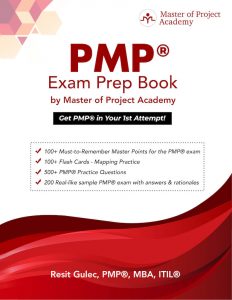
We will list a sponsored prep book as the first CAPM certification training book in this list from Master of Project Academy PMP. However, we do not review this book to provide an unbiased review of all available CAPM books. Hence, we have just listed the features and strengths of this CAPM certification book.
Although it is a PMP Prep Book, since the PMP and CAPM contents are similar, you can use this PMP Prep Book in your CAPM certification study as well.
After helping 125,000+ professionals to pass their CAPM certification exam with a 99.6% first attempt pass rate, Master of Project Academy has published this PMP & CAPM prep book. The majority of the PMP books in the market contain theoretical project management knowledge with an outdated teaching style. But, the unique aspect of this PMP book compared to other PMP books in the market is PMP® Prep Book by Master of Project Academy content has been organized like a real project.
While learning CAPM certification exam content, you will be able to see the practical implications of theoretical knowledge. Hence, this will help you to grasp the details of the CAPM exam content easily. Consequently, PMP Prep Book by Master of Project Academy will help you to pass the CAPM exam in your first attempt.
Unique features of the PMP® Prep Book by Master of Project Academy are:
– Real-life project examples
– 100+ Must-to-Remember Master Points for the PMP® Exam
– 100+ Flash Cards – Mapping Practice for important concepts
– 500+ PMP® Practice Questions – Answers & Detailed Rationales
– 550+ Pages PMP eBook PDF downloadable right after your purchase
Besides, unlike the other PMP and CAPM book providers, Master of Project Academy provides a sample free PMP book for you to review the PMP Prep Book before your purchase.
2. Rita Mulcahy CAPM exam prep 4th edition paperback
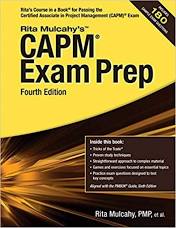
- This is a top-selling CAPM Prep book written by renowned author Rita Mulcahy
- It includes current information based on relevant topics.
- Besides, this book has useful insights but it alone doesn’t suffice the preparation for CAPM certification exam
- Furthermore, it has separate sections on test-taking strategies
- This book is very much in detail to help aspirants to get a thorough overview of vital topics
- It has lots of activities and sample questions to help students ace the exam
- Overall, this is a comprehensive guide
- However, the shortcoming of this book is that it includes only questions at the end of a chapter rather than the full sample exam
3. CAPM Exam Secrets Test Prep Team
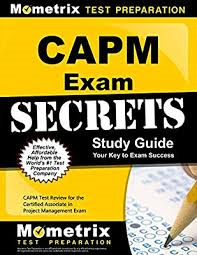
- This is an alternative to the conventional book style of studying.
- Moreover, it uses a flashcard approach to study materials
- This works well for those candidates with good memorization skills
- A large amount of information is embedded on the card but it is worth the data
- Further, flashcards help to make the complicated formulas memorize in an easier manner.
- It has evolved an innovative study method for easier memorization of formulas
- Besides, the information is well structured in flashcards
- Moreover, it acts as a supplement to study guides and textbooks
- Hence, this enhances good chances of success in the exam
- One disadvantage is that it has cards with lots of words on it which could be easily condensed.
4. Joseph Phillips CAPM/PMP All in one Exam Guide, 3rd Edition
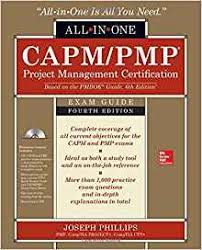
- This is also available in Kindle version
- Besides, it covers the essential exam topics and material in an easy to understand format
- This is straightforward, easy to read text with very simple language
- However, it is also considered as a reference guide especially for CAPM professionals
- Also, this guide includes CD and numerous sample questions
- Practice questions are very simple not very challenging.
5. Aileen Ellis CAPM Exam Simplified PMBOK (Kindle Edition)
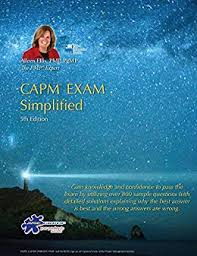
- This book is budget-friendly
- It is ideal for those aspirants seeking a simplified approach to studying
- Besides, it is a very thorough book written in a style to help in simplification of a challenging 3-hour exam
- Another name used for this book is “CAPM for Dummies” study guide
- However, the Kindle version of this book includes readable charts and other graphics
- Consequently, it is considered a very affordable study guide
- One disadvantage is that the structure of sample questions does not match the actual exam
- Also, it has many typo errors
- Besides, there are not many numerical questions.
6. Steve Caseley CAPM Q&A Kindle Edition
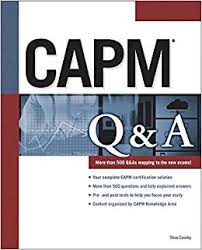
- This is the most versatile comprehensive study guide
- Besides, it is also a reference for veteran project managers
- Moreover, this book includes both a pretest and a post-test along with numerous questions and answers
- However, the structure of the prep book is easy to read and follow
- One of the shortcomings of this book is that it doesn’t explain incorrect answers in depth.
- Also, the review questions are not very challenging
- Besides, it has some material which is redundant
Can I Prepare for CAPM Certification Online?
Yes, of course, you can prepare for CAPM certification online. The fact is that aspirants used to prefer conventional approach i.e. classroom training in earlier times. But, now due to busy schedules and workload, candidates want to learn at their own pace. Also, they need flexibility so that they can balance work and personal life. Similarly, as a working professional, they want some spare time to prepare for CAPM certification.
Benefits of preparing CAPM Certification online are:
- Online trainings are more flexible as compared to classroom training. So you can learn at your own pace and can choose your timing and location to attend the training.
- Further, they are cheaper in regards to price. Hence they are cost-effective.
- Besides, online courses ensure high-quality content
- Moreover, it gives you the benefit to go through the content as many times as you wish to.
- Also, you can spend more time or less time to attend a specific lesson on the training course. This means you have flexibility in time to spend on training and get ample time to understand the content and grasp the information.
How Much Can I Earn After I Get CAPM Certification?
It depends upon a number of factors to determine the salary such as Educational Background, Skillset, Area of Expertise, Work Experience and Country of Employment. For instance: CAPM certified individuals on an average may range from $41,000 to $74,000 in Canada. Whereas in India, salary may range from Rs 3,000,000 to Rs 1,148,000
How Should I Choose CAPM Certification Training?
Generally, CAPM certification training is conducted in 3 modes:
- Classroom training: This is a traditional physical classroom training where you need to be available as per the timings of class and instructor. It gives the benefit of face to face interaction with the trainer. But it doesn’t give the flexibility to learn at your own pace. The disadvantage is that you have to give up your office work or put extra hours after the office to attend the training which might not be a preferred option for working professionals.
- Self-paced online learning where you can attend training at your own pace, location, and timings. Hence, this has the utmost flexibility to manage your time and attend the training.
- Instructor-led virtual certification training: This is similar to classroom training but it gives the flexibility to attend training from any location be it your office, home, etc. The disadvantage is that you have to be available as per the instructor’s time slot availability which is not convenient for working professionals. So they have to juggle in office work and training.
Hence, when making a choice for the best training provider, look for a few points like reliability, whether contact hours are recognized by PMI. Besides, go through the student’s testimonials to determine the pros and cons of the training providers. Furthermore, check for refund guarantee, quality of the content in feedbacks and online reviews. Last but not least, the course should be cost-effective.
What Are the CAPM Certification Knowledge Areas?
All the work you do on a project is made up of processes. There is a pattern to all of the work that gets done on your project. First, you have to plan it and after you get to work. Furthermore, when you are doing the work, you should compare your project to the original plan all the time. When things start to get off the plan, it’s your job to make corrections and put everything back on track. So the process framework i.e. Process Groups and Knowledge areas ensures that all of this happens in a smooth way.
Processes are grouped by Process Groups or Knowledge Areas.
We know that PMBOK is the main reference book for CAPM Certification preparation and it is organized by knowledge areas to make you understand the specific area in depth. Hence, in order to prepare for CAPM certification, one needs to understand knowledge areas in detail.
Knowledge areas are the identified areas of project management and they are defined by their knowledge requirements. They are described in terms of their component processes, practices, inputs, outputs, tools, and techniques.
Knowledge areas are interrelated but they are defined separately from the project management perspective.
PMBOK Guide has identified 10 knowledge areas. Most of the time, you use these 10 knowledge areas in most projects. 10 Knowledge areas in the PMBOK Guide are as follows:
Project Integration Management
This knowledge area concerns with coordinating all aspects of the project plan. It is highly interactive. This involves identifying and defining the work of the project and combining, unifying, and integrating the appropriate processes. Besides, it also takes into account satisfactorily meeting the requirements of the customer and stakeholders and also managing their expectations.
Project planning, project execution, project work monitoring, and change control occur throughout the project and are repeated continuously while you are working on the project. Monitoring the work of the project involves anticipating potential problems and issues and dealing with them before they reach a critical point. Change control affects the project plan which in turn affects the work of the project which, in turn, can affect the project management plan so you can see that these processes are tightly linked. The processes in this area also interact with other processes in other knowledge areas.
It includes 7 processes:
- Develop Project Charter
- Develop Project Management Plan
- Direct and Manage Project work
- Manage Project Knowledge
- Monitor and Control Project work
- Perform Integrated Change control
- Close Project or Phase
2. Project Scope Management
This knowledge area concerns with defining all the work of the project and only the work needed to successfully produce the project goals. These processes are highly interactive. Further, they clarify and control what is part of the project and what is not. Also, each process happens at least once and generally many times throughout the project’s life.
Project Scope Management covers both product scope and project scope. Product scope is related to the characteristics of the product, service or result of the project. It is measured against the product requirements to determine successful completion or fulfillment. The application area usually dictates the process tools and techniques you will use to define and manage the product scope. The project scope involves managing the work of the project and only the work of the project. In the same way, the project scope is measured against the project management plan, the project scope statement, the work breakdown structure (WBS) and WBS dictionary.
It includes 6 processes which are:
- Plan Scope Management
- Collect Requirements
- Define Scope
- Create WBS
- Validate Scope
- Control Scope
3. Project Schedule Management
In this third knowledge area, you estimate the duration of the project plan activities, devise a project schedule, monitor and control deviations from the schedule. As a whole, this knowledge area deals with completing the project in a timely manner. Time management is a very critical aspect of project management because it is about keeping the project activities on track and monitoring those activities against the project plan in order to ensure that the project is completed on time. Each process in this knowledge area happens at least once in every project and sometimes more. In many cases, particularly on small projects, Sequence Activities, Estimate activity duration and Develop Schedule are completed as one activity. In a small project, only one person is needed to complete these processes and they are all worked on at the same time.
It involves 6 Processes which are:
- Plan Schedule Management
- Define Activities
- Sequence Activities
- Estimate Activity Durations
- Develop Schedule
- Control Schedule
4. Project Cost Management
This knowledge area concerns with cost and budgets. The activities in this knowledge area establish cost estimates for resources, set up budgets and inspect those costs to guarantee that the project stays within the approved budget. Project Cost Management knowledge area primarily concerns with the costs of resources. It also includes ongoing maintenance and support cost for software considered for the project. Depending upon the complexity of the project, these processes might need the involvement of more than one person. For instance, on small projects especially of smaller scope, cost estimating and cost budgeting are tightly linked. You can view it as a single process that a single person can perform over a relatively short period of time.
It involves 4 processes which are:
- Plan Cost Management
- Estimate Costs
- Determine Budget
- Control Costs
5. Project Quality Management
This knowledge area concerns with assuring that the project meets the requirements that it was undertaken to produce. It focuses on product quality as well on the quality of the project management processes used during the project. The processes of the Project Quality Management measure overall performance and monitor project results and compare them to the quality standards set out in the project planning process. This is to ensure that the customers will receive the product, service or result they commissioned. Besides, it also supports continuous process improvement activities as undertaken on behalf of the performing organization.
It involves 3 processes which are:
- Plan Quality Management
- Manage Quality
- Control Quality
6. Project Resource Management
This knowledge area concerns all aspects of project management and personal interaction including leading, coaching, dealing with conflict, conducting performance appraisals and more. The processes of Project Resource Management ensure that the human resources allocated to the project are used in the most effective way possible. Each stakeholder requires the use of different communication styles, leadership skills, and team-building skills. A good project manager knows when to execute certain skills and communication styles depending on the situation. The processes in this knowledge area ensure that the right resources will be available to the project manager and project team at the right time and place.
It involves 6 processes which are:
- Plan Resource Management
- Estimate Activity Resources
- Acquire Resources
- Develop Team
- Manage Team
- Control Resources
There is a distinction between the skills and competencies needed for the project manager to manage team resources versus physical resources. Here physical resources include equipment, materials, facilities, and infrastructure. On the other hand, team resources or personnel refer to human resources. Personnel may have varied skillsets and may be assigned full or part-time and may be added or removed from the project team as the project progresses.
7. Project Communications Management
The Project Communications Management knowledge area concerns with general communication skills. But they encompass much more than an exchange of information. Communication skills are considered general management skills that the project manager uses every day. The purpose of the processes in this knowledge area is to guarantee that all project information including project plans, risk assessments, meeting notes, etc is collected, documented, archived and disposed of at the proper time. These processes also ensure that information is distributed and shared with stakeholders, management and project members at appropriate times. Project Communications Management consists of 2 parts. The first part is developing a strategy to ensure that communication is effective for stakeholders. The second part is implementing the activities necessary to fulfill the communication strategy.
After the project is closed, the information is archived to be used as a reference for forthcoming projects. This information is referred to as historical information in several processes. Everyone on the project is somewhat involved in this knowledge area. That’s because all project members will send and receive project communication throughout the life of the project. However, it is important that all team members and stakeholders understand how communication affects the project.
It involves 3 processes which are:
- Plan Communications Management
- Manage Communications
- Monitor Communications

8. Project Risk Management
This knowledge area is about identifying, analyzing and planning for potential risks, both positive and negative that might impact the project. This means minimizing the probability and impact of negative risks while maximizing the probability and impact of positive risks. Furthermore, these processes are also used to identify the positive consequences of risks and exploit them to further improve project objectives or discover efficiencies that might improve project performance. Always remember that risk includes both threats to and opportunities within the project. At times, organizations combine several of these processes into one step. Moreover, the important aspect of the Project Risk Management Knowledge area is to strive to identify all the risks and develop responses for those with the greatest consequences to the project objectives.
Risk exists at 2 levels within every project. However, it is important to consider the riskiness of the overall project which arises from the combination of individual project risks and other sources of uncertainty. Processes in these knowledge areas address both levels of risks in projects. Individual project risk can have a positive or negative effect on project objectives if they occur. On the other hand, unmanaged threats may have results such as delay, cost overruns, performance shortfall, or loss of reputation. Opportunities that are captured can lead to benefits such as reduced cost and time, improved performance or reputation. Management of overall project risk intends to keep project risk exposure within an acceptable range by reducing drivers of negative variation, promoting drivers of positive variation and maximizing the probability of achieving all project objectives.
It involves 7 processes which are:
- Plan Risk Management
- Identify Risks
- Perform Qualitative Risk Analysis
- Perform Quantitative Risk Analysis
- Plan Risk Responses
- Implement Risk Responses
- Monitor Risks
9. Project Procurement Management
For smaller organizations or start-up companies and those without a purchasing, contracting or procurement department the project managers may assume the purchasing authority role to negotiate and sign contracts directly. However, for mature organizations, the actual procurement, and contracting functions will be carried out by a separate department with the specific role to purchase, negotiate and sign contracts.
The project managers not only need to be involved along the way but also they should assist the procurement department with project input. However, they must also plan the amount of time that the procurements will take. In fact, the procurement process follows from start to finish. Processes define how procurement management works on a properly managed project. And how it relates to the project life cycle and the project management process.
This knowledge area concerns with processes involved with purchasing goods or services from vendors, contractors, suppliers, and others outside the project team. Also, it includes the management and control processes needed to develop and administer agreements such as contracts, purchase orders, memoranda of agreements (MOA) or internal service level agreements (SLA). This process involves agreements that describe the relationship between 2 parties – a buyer and a seller.
It involves 3 processes which are:
- Plan Procurement Management
- Conduct Procurements
- Control Procurements
10. Project Stakeholder Management
This knowledge area concerns identifying all stakeholders, analyzing their power, interest, and level of engagement, elicit their requirements and expectations. Then evaluate and incorporate all of that information into product and project scope. Every project has stakeholders who are affected by or can affect the project in a positive or negative way. Some stakeholders may have a limited ability to influence the project work or outcomes meanwhile others may have a significant influence on the project and its expected outcomes.
Always remember that engaging stakeholders should take place throughout the life of the project. In other words, you need to build and maintain positive relationships with stakeholders. Also, make sure that they continue to be involved in the project at a level necessary to make a success. Moreover, the processes in this knowledge area support the work of the project team to analyze stakeholder expectations. So you should check the degree to which they impact or are impacted by the project. Furthermore, they develop strategies to effectively engage stakeholders in support of project decisions and the planning and execution of the work of the project. Hence, the skills of the project manager and team to correctly identify and engage all the stakeholders in a suitable way can mean the difference between project success and failure.
It involves 4 processes which are:
- Identify Stakeholders
- Plan Stakeholder Engagement
- Manage Stakeholder Engagement
- Monitor Stakeholder Engagement
What Are the CAPM Certification Exam Formulas?
CAPM Certification exam includes fundamental questions, definitions, and formulas. Hence, CAPM certification exam formulas are one of the important areas to focus on. Here, I am going to list all the formulas organized by the knowledge area for your quick reference.
| S.No | Knowledge Area | Topic | Formula |
| 1 | Integration Management | ||
| Internal Rate of Return (IRR) | Select the project with the highest IRR | ||
| Present Value (PV) | PV =FV/(1+r) raised to n | ||
| Project Selection Methods | Net Present Value (NPV) | Select the project with the highest NPV | |
| Payback Period | Select the project with a shorter payback period. | ||
| Cost-Benefit Analysis | Select the project with higher Benefit-Cost Ratio (BCR) | ||
| Opportunity Cost | It is the value of the project that is not selected | ||
| Sunk Cost | Don’t consider sunk cost when deciding whether to continue with a troubled project | ||
| 2 | Schedule Management | ||
| Standard Deviation | SD= (P-O)/6 | ||
| Variance | [(P-O)/6]raised to 2 | ||
| Three-Point Estimating | Simple Average | Average = ( P+M+O)/3 | |
| Weighted Average | PERT =(P+4M+O)/6 | ||
| Float Free Float | Float =LS-ES or LF-EF Free float = ES of Successor activity –EF of current activity | ||
| 3 | Cost Management | ||
| Planned Value | PV= BAC* Planned% complete where Planned% complete =Given Amount/Total amount | ||
| Earned Value | EV= BAC*Actual% complete where Actual% complete=Actual Amount/Total Amount | ||
| Earned Value Management | Schedule Performance Index | SPI =EV/PV If SPI >1 that means you are ahead of schedule If SPI <1 that means you are behind the schedule | |
| Schedule Variance | SV= EV-PV. If SV is negative that means it is behind schedule. If SV is positive that means it is ahead of schedule. | ||
| Cost Performance Index | CPI= EV/AC If CPI >1 that means you are within your budget If CPI <1 that means you have blown your budget | ||
| Cost Variance | CV=EV-AC If CV is negative that means it is over budget If CV is positive that means it is under budget |
Other formulas are:-
| S.No | Knowledge Area | Topic | Formula |
| Forecasting | Estimate at Completion | Case 1: Assumption that original estimate was fundamentally flawed EAC= AC+ bottom-up ETC Case 2: Assumption that if no variances from BAC have occurred or you will Continue at the same rate of spending EAC=BAC/CPI Case 3: Assumption that current variances are thought to be atypical of the future EAC=AC+(BAC-EV) Case 4: Assumption that current variances are thought to be typical of the future and when project schedule constraints will influence completion of remaining effort EAC=AC+(BAC-EV)/CPI*SPI | |
| Estimate to Complete | ETC=EAC-AC | ||
| Variance at Completion | VAC= BAC-EAC If VAC is negative that means you end up spending more than your budget If VAC is positive that means you spend less than your budget | ||
| 4 | Risk Management | Expected Monetary Value | EMV=Probability * Impact |
| 5 | Procurement Management | Target price | TP=Target Cost +Target Fee |
| Final price | FP=Actual Cost +Actual Fee | ||
| Sharing Ratio | (X%/Y %) Where X% is buyer share and Y% is seller share | ||
| The total point of assumption (TPA) | TPA= (Ceiling price –Target Price)/Buyer’s share ratio +Target Cost Where Ceiling price is the highest price the buyer will pay. |
How Should I Study for the CAPM Exam?
CAPM certification exam is not an easy nut to crack if you are not having any prior project management experience.
Firstly, prepare a study plan alone or join a study group preparing for CAPM certification.
Secondly, you need to have a CAPM certification preparation study guide along with a PMBOK book as the main reference.
Thirdly, you need to find a reliable training provider who can conduct training on CAPM training. Hence, you need to attend project management training and attain 23 PDUS required to apply for the exam.
The next step is to understand the structure of the exam and the content of the exam. Then start reading the first chapter from PMBOK and alternatively from another preparation study guide until you go through the entire book. Besides, you need to practice the sample questions at the end of each chapter along with reading the book. Since the CAPM certification exam focuses more on knowledge of PMBOK Guide so just give 3 passes to PMBOK Guide. Then start practicing multiple mock exams from different sources to get the feel of different types of questions. Furthermore, focus on those areas where you went wrong. Read those weak areas from different books to clarify the concept. Then you need to appear for those questions again and see how you score this time. This way it will help you strengthen the weak areas.
Once you start scoring 80-85% consistently in mock simulation exams then you know where you stand and you are ready to appear for the actual exam. Hence, thereby schedule the exam and you are ready to rock the exam!

Should I Use CAPM Question Bank?
Yes, of course, you should use CAPM question banks. These question banks are prepared based on the experience of certified professionals and knowledge of aspirants who have appeared for the exam. They are a simulation of the real certification exam. Also, it helps the aspirants to gauge where you stand after each chapter you learn. Thereby, an aspirant can try it multiple times to help you map your progress. In fact, these question banks help the aspirants to identify which area of project management they are weak in and work on strengthening them. Besides, it helps professionals to get the flavor of different types of questions on the exam.
How Can I Earn CAPM PDUs?
If you have a CAPM certification, you do not need to earn professional development units (PDUS). Instead, you need to again appear for examination before the end of your 5-year certification cycle. However, it is expected that you gain at least 3 years of Project Management experience and sit for the PMP certification exam rather than retaking CAPM exam.
Hence, you just need to earn 23 contact hours for applying for the CAPM certification exam. These 23 hours can be attained by attending project management education of 23 hours duration from any training institute.
When is the Next CAPM Certification Exam Date?
As such, there is no fixed schedule for the CAPM certification exam. For the current version of the CAPM certification exam, the last day for candidates to take is 28 August 2019. Hence, the key is whenever you are ready for the exam, you can schedule your exam and sit for the exam.
What is the CAPM Certification Exam Passing Score?
There is no information available on the passing score of the CAPM certification exam. The reason is that PMI does not reveal this information. However, the passing score for all PMI exams is determined by sound psychometric analysis. They use Subject Matter Experts (SMEs) from across the world to help set up a point at which each candidate should pass the exam and the exam point of difficulty. Besides, it is a common perception that you may pass the exam if you score above 61% but no one can guarantee the truth of this claim. Hence, my suggestion is to aim for more than 70% in your CAPM certification exam.
Please make a note that the CAPM certification exam consists of 15 pretest questions but the score of these questions will not be added to your score. These questions are randomly placed among the other questions so you will not be able to differentiate them. Hence, consider all 150 questions as real test questions and answer them with the same sincerity.
What Are the Benefits of CAPM Certification?
- First of all, it helps an individual to demonstrate his understanding of the basic principles and terminology of project management.
- Secondly, it offers recognition to practitioners who are interested in starting a career in project management.
- Thirdly, CAPM Certification demonstrates that the individual possesses the knowledge in principles and terminology of PMBOK Guide. PMBOK guide is the main reference book of CAPM certification as it outlines the generally recognized good practices in project management.
- Additionally, it allows individuals with specialized skills to align their work with project managers.
- Besides, CAPM certified knowledge can be applied on-job to grow the level of competence in the project management area.
- Moreover, CAPM Certified individuals garner a high level of credibility from project managers, employers, and peers.
- Further, it enhances the chances of employment and gives you recognition in the workplace.
- In addition to above, learning material fosters confidence among candidates making them aware of the tools and best practices of project management
- On top of the above, it gives an opportunity to people with project-related experience to prove their understanding of basic terminology and principles of project management.
- Besides, it is useful for professionals who desire a professional certification but lacks the experience requirements for the PMP certification
- Also, it can also be a useful stepping stone to the more prestigious Project Management Professional (PMP) certification.
- Last but not least, CAPM certification validates a candidate’s skills in initiating, developing, managing and running large scale projects.
How can I Renew CAPM Certification?
CAPM Certification is valid for 5 years. In order to renew CAPM certification, one needs to appear for the CAPM certification exam again before completion of 5 years. As a result, there is no provision to renew the CAPM certification by earning PDUs.
What Changes in the CAPM Certification Exam and When?
PMI keeps reviewing the content and changes the exam content every few years. These changes occur due to role delineation study or new exam content outlines or a new version of the PMBOK Guide.
However, PMI has made few changes in the exam that has changed after 28 August 2019 which are as follows:
Change in Eligibility Criteria of Exam Application
Earlier, there were 2 options related to experience i.e. either candidate should have 1,500 hours of working on the project or they needed to have 23 Contact hours by attending project management training from an institute.
Now they have simplified the process by removing the 1,500 hours experience of working on the project. Hence, now you only need to have 23 contact hours by attending a training program related to project management.
Please make a note that there is no change in education requirements. Therefore, you need to have a secondary degree i.e. high school diploma, associate degree or global equivalent to apply for the exam.
Another big change that will help CAPM aspirants to appear for the PMP exam is that now it is easier for CAPM certified people to apply directly for the PMP exam without the need to have 35 contact hours.
Structural Change in Question Type
There is no change to the question content of the CAPM exam and syllabus also remains the same. But, only 2 new types of question types are introduced i.e. matching and multiple-choice questions with more than one correct answer.
a) In matching questions, you have 2 lists. Thus you have to match the items in these 2 lists as per the instructions mentioned.
b) For multiple-choice questions with multiple answers, you have to identify them all. Here, the instructions will indicate exactly how many correct answers to choose from given options. There is no guesswork for aspirants
To summarize, the above-mentioned changes will be implemented after 28 August 2019. Therefore, if you appear for the exam after 28 August 2019, the above changes will be reflected in the exam which is relatively minor.
Conclusion
CAPM Certification is a great starting point for those are new to project management and want to accelerate their career. It is based on the PMBOK Guide. Even though it is not as popular as PMP certification this credential is suitable for professionals who are into a project team and wants to grow into project management role.
Undoubtedly, this certification is a stepping stone towards PMP certification. Moreover, becoming a PMI member is advantageous before applying for CAPM certification. Because it saves money in exam fee as well give the opportunity to network and access to numerous resources of project management. Once you are a PMI member, the CAPM certification exam fee is 225 USD.
However, Syllabus is the same for the CAPM and PMP exams. But, the only difference is that CAPM certification exam checks knowledge on a fundamental level, terminology of PMI’s project management framework defined in PMBOK Guide whereas PMP certification exam checks knowledge on a broader level in terms of implementation in projects. Besides, the CAPM certification exam can be taken at a registered testing center or candidates can take the online proctored exam.
CAPM certification is valid for 5 years. You do not need to earn any PDUS to renew CAPM certification unlike PMP, where you have to earn 60 PDUS in a 3-year cycle to renew the certification. However, you have to appear for the CAPM exam again before the expiry of the 5-year certification cycle.

